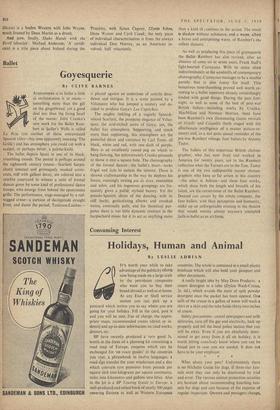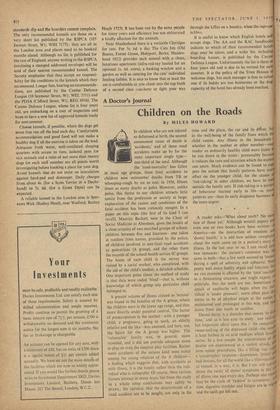Consuming Interest
Holidays, Human and Animal
By LESLIE ADRIAN BP have recently produced a very good 5s. worth in the form of a planning kit containing a road map of Europe, coupons which can be exchanged for 'en route guides' in the countries you visit, a phrasebook in twelve languages, a road-sign transfer for your windscreen and a disc which converts tyre pressures from pounds per square inch into kilograms per square centimetre, miles into kilometres and gallons into litres. Also in the kit is a BP Touring Guide to Europe, a well-produced and edited book of nearly 300 pages covering Eastern as well as Western European countries. The whole is contained in a small plastic briefcase which will also hold your passport and other documents.
A really bright idea by May Dorn Products : a cream detergent in a tube (Dylon Wash-Creme, 2s. 6d.), which avoids the mess of spilt powder detergent once the packet has been opened. One inCh of the cream in a gallon of water will wash a shirt or a skirt and the tube holds thirty-two inches of cream.
Safety precautions : cancel newspapers and milk deliveries, turn off the gas and electricity, lock up properly and tell the local police station that you will be away. Even if you are absolutely deter- mined to get away from it all on holiday, it is worth letting somebody know where you can be found just in case you are needed. It does not have to be your employer.
What about your pets? Unfortunately there is no Michelin Guide for dogs. If three-star ken- nels exist they can only be discovered by trial and error. The various animal protection societies are hesitant about recommending boarding ken- nels for dogs and cats because of the expense of regular inspection. Owners and managers change,
standards stip and the boarders cannot complain. The only recommended kennels are those on a very short list published by the RSPCA (105 Jermyn Street, WI; WHI 7177): they are all in the London area and places need to be booked months ahead. Although no list is published for the rest of England, anyone writing to the RSPCA (enclosing a stamped addressed envelope) will be told of their nearest recommended kennel. The Society emphasise that they accept no responsi- bility for the conditions in the kennels which they recommend. Longer lists, bearing no recommenda- tions, are published by the Canine Defence League (10 Seymour Street, WI; WEL 5511) and the PDSA (Clifford Street. WI; REG 6916). The Canine Defence League, whose list is four years old, are embarking on a tour of inspection and hope to have a new list of approved kennels ready for next summer.
Choose kennels, if possible, where the dogs get some free run off the lead each day. Comfortable accommodation and good food will not make a healthy dog if all the exercise is taken on the lead. Adequate fresh water, well-ventilated sleeping quarters with access to runs, isolated pens for sick animals and a ratio of not more than twenty dogs for each staff member are all points worth investigating before booking a place for your dog. Avoid kennels that do not insist on inoculation against hard-pad and distemper. Daily charges from about 4s. (for a Scots Terrier or a Dachs- hund) to 7s. 6d. (for a Great Dane) can be expected.
A reliable kennel in the I.ondon area is Spar- rows Wick (Bushey Heath, near Watford; Bushey Heath 1523). ft has been run by the same people for many years and efficiency has not obliterated a kindly affection for the animals.
Near Maidenhead there is a veritable Claridges for cats. For 5s. 6d. a day The Cats Inn (Old Beams, Forest Green, Holyport, Berks; Maiden- head 1812) provides each animal with a clean, luxurious apartment (infra-red-ray heated for an optional Is. 6d. extra), a basking window and a garden as well as catering for the cats' individual feeding foibles. It is nice to know that at least the cat is comfortable as you climb into the top bunk of a second class couchette or fight your way through the Uffizi on a Sunday, when the ingressO is libro.
It is useful to know which English hotels will accept dogs. The AA and the RAC handbooks indicate to which of their recommended hotels dogs may be taken, and a wider list, including boarding houses, is published by the Canine Defence League. Unfortunately the list is three or four years old and is due to be revised for nest summer. It is the policy of the Trust Houses 10 welcome dogs, but each manager is free to refuse one if its habits are too boisterous or the dog' capacity of the hotel has already been reached.







































 Previous page
Previous page